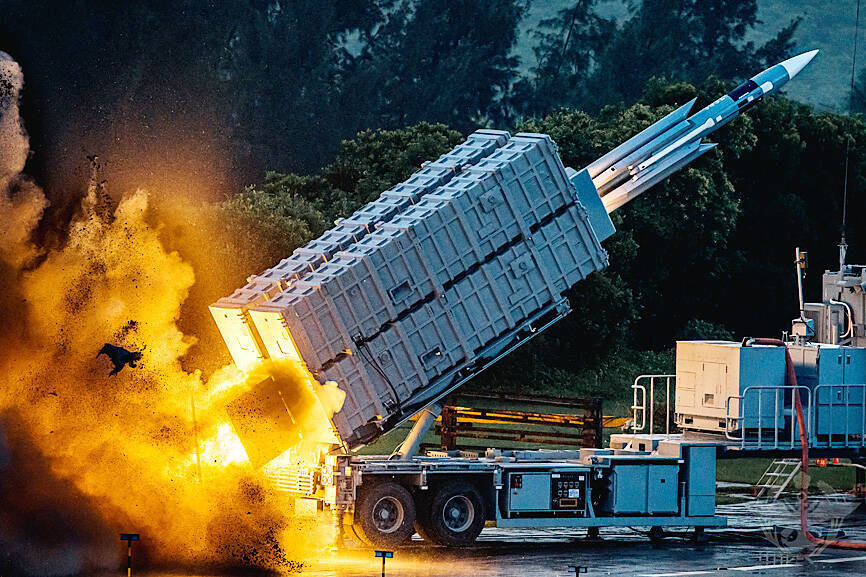Taiwan is developing a hypersonic missile based on the Ching Tien (擎天) supersonic cruise missile, and a Czech-made truck has been tentatively selected as its launch vehicle, a source said yesterday.
The Ching Tien, formerly known as Yun Feng (雲峰, “Cloud Peak”), is a domestically developed missile with a range of 1,200km to 2,000km being deployed in casemate-type positions as of last month, an official said, speaking on the condition of anonymity.
The hypersonic missile to be derived from the Ching Tien would feature improved range and a mobile launch platform, while the latter would most likely be a 12x12 single chassis truck designed by the Czech company Tatra, they said.

Photo: EPA-EFE / the Ministry of National Defense
The Oshkosh M983 is another vehicle being considered for the missile, they said.
The military and the Ministry of National Defense-affiliated Chungshan Institute of Science and Technology, the missile’s designer, are reaching out to manufacturers about potentially buying tactical trucks, the official said.
The hypersonic cruise missile would significantly boost the military’s deep strike capabilities, and using a mobile launch platform would make the system more survivable in combat, they said.
The military additionally seeks to obtain an 8x8 single-chassis vehicle to serve as a test launch vehicle for the hypersonic missile and potentially a replacement for the existing fleet of Taiwanese launch vehicles, they said.
The existing mobile launch platforms for domestically developed missiles are semitrucks that are more difficult to handle and time-consuming to deploy into position compared with single-chassis designs being used in Western militaries, they said.
Earlier this year, the Ministry of National Defense published a solicitation for the development of heat-resistant ceramic materials and high-performance rocket engines in a first hint of a hypersonic missile program.
Aerospace researcher and Chungshan Institute of Science and Technology adviser Su Yu-pen (蘇玉本) said at the time that Taiwan has the technological wherewithal to create a hypersonic weapon if composite materials could be designed for use in rocket engines.

CHAOS: Iranians took to the streets playing celebratory music after reports of Khamenei’s death on Saturday, while mourners also gathered in Tehran yesterday Iranian Supreme Leader Ayatollah Ali Khamenei was killed in a major attack on Iran launched by Israel and the US, throwing the future of the Islamic republic into doubt and raising the risk of regional instability. Iranian state television and the state-run IRNA news agency announced the 86-year-old’s death early yesterday. US President Donald Trump said it gave Iranians their “greatest chance” to “take back” their country. The announcements came after a joint US and Israeli aerial bombardment that targeted Iranian military and governmental sites. Trump said the “heavy and pinpoint bombing” would continue through the week or as long

TRUST: The KMT said it respected the US’ timing and considerations, and hoped it would continue to honor its commitments to helping Taiwan bolster its defenses and deterrence US President Donald Trump is delaying a multibillion-dollar arms sale to Taiwan to ensure his visit to Beijing is successful, a New York Times report said. The weapons sales package has stalled in the US Department of State, the report said, citing US officials it did not identify. The White House has told agencies not to push forward ahead of Trump’s meeting with Chinese President Xi Jinping (習近平), it said. The two last month held a phone call to discuss trade and geopolitical flashpoints ahead of the summit. Xi raised the Taiwan issue and urged the US to handle arms sales to

BIG SPENDERS: Foreign investors bought the most Taiwan equities since 2005, signaling confidence that an AI boom would continue to benefit chipmakers Taiwan Semiconductor Manufacturing Co’s (TSMC, 台積電) market capitalization swelled to US$2 trillion for the first time following a 4.25 percent rally in its American depositary receipts (ADR) overnight, putting the world’s biggest contract chipmaker sixth on the list of the world’s biggest companies by market capitalization, just behind Amazon.com Inc. The site CompaniesMarketcap.com ranked TSMC ahead of Saudi Aramco and Meta Platforms Inc. The Taiwanese company’s ADRs on Tuesday surged to US$385.75 on the New York Stock Exchange, as strong demand for artificial intelligence (AI) applications led to chip supply constraints and boost revenue growth to record-breaking levels. Each TSMC ADR represents

Pro-democracy media tycoon Jimmy Lai’s (黎智英) fraud conviction and prison sentence were yesterday overturned by a Hong Kong court, in a surprise legal decision that comes soon after Lai was jailed for 20 years on a separate national security charge. Judges Jeremy Poon (潘兆初), Anthea Pang (彭寶琴) and Derek Pang (彭偉昌) said in the judgement that they allowed the appeal from Lai, and another defendant in the case, to proceed, as a lower court judge had “erred.” “The Court of Appeal gave them leave to appeal against their conviction, allowed their appeals, quashed the convictions and set aside the sentences,” the judges